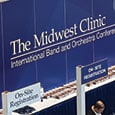As another competitive marching band season comes to an end, for many of us, a new festival season is on the horizon. When we think about preparing students for the next wave of concert band, jazz, or solo and ensemble festivals, we may not often consider how we arrived in the competitive arena in the first place. As we know, not every festival doles out first, second, and third place rankings, divisional ratings, medals, or caption awards. While it is noble to believe we participate in festivals solely because of the intrinsic qualities that inspired us to study music education in the first place, realistically, the competitive overtones inherent in most of these festivals encourage us to push our students to succeed even more because of our seemingly innate obsession with winning.
This realization has left many divided on the merit of competition in music. While avid proponents of music competition have argued that festival preparation enables students to achieve a level of mastery that might otherwise go unattained, critics of competition have disputed these claims, suggesting music competition favors conformity over creativity and detracts from music as an art form. Furthermore, competition produces few winners with many losers, a practice that is diametrically opposed to the inclusion of music in the school curriculum based on its aesthetic value.
Regardless of one’s stance on this issue, we could perhaps all agree that competition is becoming increasingly pervasive in all areas of school music programs. While our rationales for participating in music festivals may vary widely, we may all find ourselves somewhere in the contest circuit in the near future. Although competition is still a blossoming topic in the music education literature, there have been a few noteworthy contributions that just might pique the interest of contest goers and alter the way we view music competition.
Music competition is not new.
The music contest, in its infancy, is believed to have been developed in ancient Greece, where groups of singers, instrumentalists, and solo performers would compete against one another at various feasts and festivals. The spirit of the ancient Grecian music contests eventually made its way throughout Europe, with primitive music competitions dating back to the German Minnesingers and Meister-singers contests of the seventh century and the Welsh eisteddfods of the fourteenth century. Music competition ultimately reached the United States, with early evidence suggesting that contests for violin and voice once took place in Virginia in 1737. However, one of the earliest known publicized music competitions occurred in Massachusetts in 1790, when the Stoughton society, organized and led under the direction of William Billings, defeated the Dorchester society in a singing contest after successfully singing Handel’s Hallelujah Chorus from memory.
The first national band competition in the United States was a failure.
After a meeting in Chicago in 1923, a group known as the National Association of Band Instrument Manufacturers began a series of national band competitions after experiencing a significant decrease in band instrument manufacturing. The first of these competitions was the 1923 Schools Band Contest of America, which was heavily promoted by advertising agent Patrick Henry, who passionately endorsed the event in newspapers by exaggerating its scope. A mere 30 bands registered for the contest, but Henry alleged as many as 6,000 instrumentalists from 200 school bands would participate. Henry also claimed a renowned panel of judges would adjudicate the contest, when in actuality the only judge who attended the competition was Lieutenant William H. Santelmann, who was at that time the conductor of the United States Marine Corps Band. Besides the overblown promotion, it was determined that poor organization, ineffective management, inadequate performance spaces, controversial adjudication procedures, and a disregard for bands of different sizes and instrumentation tainted the 1923 Schools Band Contest of America to the point where another national band contest did not occur for another three years.
Contest ratings have been consistently inflating since the 1950s.
In a trend study that analyzed grade inflation of band contest ratings from the Ohio Music Education Association State Band Festival between the years 1951 and 2000, it was discovered average scores of bands had risen 7.9% over the course of the 50-year study. The percentage of superior marks given also experienced an average increase of 16.3% overall to the point where Division I and Division II ratings were awarded almost equally between 1971 and 2000. These results are corroborated in more recent analyses of festival ratings, where it was revealed that 86.7% of bands earned a final rating of Division I or Division II between 2008 and 2010 in South Carolina high school band contests, while 91.5% of both middle and high school bands and orchestras earned a final rating of Division I or Division II during the year 2010 in instrumental festivals held in Virginia.
If you perform late, are well funded, and play difficult music, you should do well.
While some may see this heading and roll their eyes, these factors are actually supported through research. A consistent finding in the literature concerning adjudicator reliability in solo and ensemble festivals was the variable of performance time. While the festival scenario itself is not considered to hinder a performer’s ability to play well, events that occur later in the day tend to earn higher outcomes than morning performances. Previous research studies also have indicated ensembles that perform easier repertoire actually earn lower ratings with less consistency between adjudicator scores than groups who perform more challenging music. Additionally, research supports the notion that schools from well financed, metropolitan-area school districts are more likely to achieve higher ratings at evaluative solo and ensemble festivals. While the verdict is still out on how these factors affect performances outside of solo and ensemble events, issues concerning adjudicator reliability abound in large ensemble adjudicated performances.
Students find more value in competitive festivals than directors.
In a survey of 526 high school students from Surrey, British Columbia on the band festival experience, over half of all student participants believed the learning process is enhanced when teachers stress competition, music contests are key motivators that help improve practice habits, competition brings out the best in them, competitive festivals are more fun than noncompetitive festivals, and ensembles should be ranked in order and the rankings published for everyone to see. Despite these attitudes, prior research indicates directors tend to view the musical merit of competitions poorly but are aware of the potential nonmusical benefits of festival participation such as improving public relations for the school and using adjudicated performances as a means of motivating students.
While we may never reach unanimity on the merit of competitive musical activities, it is important to generate discussion on this topic and discover meaningful ways of enhancing our students’ musical experiences. As long as what we do as music educators is always in the best interest of our students, our individual decisions on competition are justified.






